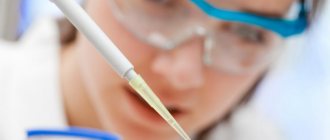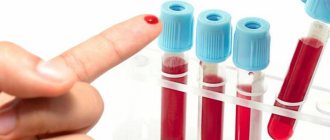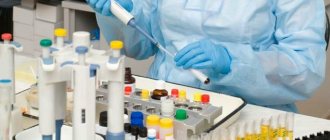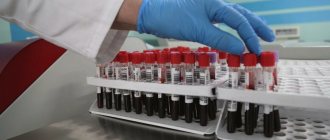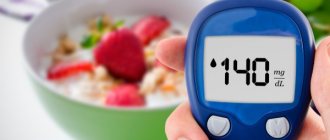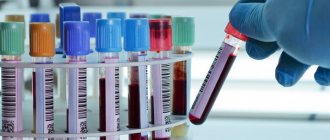Poor blood clotting during pregnancy is a pathological condition that carries risks for the health of the woman and the fetus. With such an anomaly, the likelihood of spontaneous abortion and severe bleeding during labor increases. It is important to identify the disorder in time and assess how dangerous it is when carrying a baby. Routine examinations will help identify pathological processes. Based on the test results, the doctor determines further pregnancy management tactics, prescribes treatment and gives recommendations aimed at bringing the coagulation rate to normal.
It is important to carry out blood fluid testing in a timely manner
general information
As you probably already guessed, hypercoagulation is increased blood clotting. During pregnancy, this pathology occurs quite often, so if you have been diagnosed with this, then first of all you need to calm down, since excessive excitement will only harm the baby. This condition is characterized by an increase in the protective functions of the body and the activity of the coagulation system. Hypercoagulation can develop on its own for various reasons, and can also be a consequence of various diseases. To choose the right therapy program, you first need to identify the problem, so a pregnant girl needs to consult with a qualified doctor and undergo a comprehensive examination.
Thrombin time
This is the period during which a clot is formed after plasma and thrombin are mixed. During pregnancy it should be 10.3-25 s. Increased values may be observed for the following reasons:
- reduced fibrinogen (less than 0.5 g/l);
- increased amount of bilirubin in blood serum;
- anticoagulant therapy;
- liver diseases;
- undergoing fibrinolytic therapy.
Reduced values of thrombin time may indicate the development of disseminated intravascular coagulation syndrome, and also indicate a high level of fibrinogen in the blood serum.
Main causes of pathology
Let's look at this in more detail. Too high blood viscosity can be due to many factors. On the one hand, it may seem that there is nothing wrong with this, however, this pathology poses a great threat to the health and life of the baby. As mentioned earlier, the reasons for increased blood clotting during pregnancy can be different. Among the main specialized specialists, the following are identified:
- disruption of the functioning of the coagulation system;
- severe intoxication of the body;
- diabetes;
- pulmonary edema;
- kidney dysfunction;
- long-term use of certain medications;
- poor or irregular diet;
- disease of infectious or viral etiology;
- genetic predisposition;
- fermentopathy;
- amyloid dystrophy;
- pathologies of blood vessels;
- consequences of previous operations.
In addition to all of the above, increased blood clotting during pregnancy may be a consequence of an unhealthy lifestyle. Therefore, it is very important that the expectant mother closely monitors her health and protects herself from any negative factors and stressful situations.
Extended coagulogram during pregnancy
Prescribed when any abnormalities are detected in a simple coagulogram. In addition to the above studies, it includes the determination of the following indicators:
- Antithrombin III. It is a protein produced in blood vessels and the liver that slows down clotting and prevents the formation of blood clots. During pregnancy, its values should be in the range of 70-120%. If they are elevated, this may indicate acute hepatitis, inflammatory diseases in the body, acute pancreatitis, vitamin K deficiency. Low AT3 values are observed in atherosclerosis, liver diseases, acute disseminated intravascular coagulation syndrome and other pathologies.
- D-dimer. It shows the process of thrombus formation and fibrin dissolution. During pregnancy, it gradually increases and by the end of gestation its value is 3-4 times greater compared to the first trimester. If its growth occurs very sharply, this may indicate kidney disease, diabetes and other problems. In the first trimester, its values should be no more than 286 ng/ml, in the second – up to 457 ng/ml, in the third – up to 644 ng/ml.
- Lupus anticoagulant (LA). These are antibodies that prevent prothrombin from being converted into thrombin. During pregnancy, VA should be absent. If it is present, this indicates autoimmune diseases, when the immune system perceives the body’s own cells as foreign and begins to fight them. A small amount of VA in the blood - up to 1.2 units - may be normal and not indicate pathology.
The interpretation of the results must be carried out by the attending physician. If abnormalities are detected, additional studies may be ordered to make an accurate diagnosis.
It is mandatory to donate blood for a coagulogram during pregnancy. This is a very informative study that will help to detect any deviations in time. If they are identified, adequate therapy will be selected to minimize risks for the mother and fetus.
Also interesting to read: glucose test during pregnancy
Source
Coagulogram, an analysis that is necessary for any woman when planning a pregnancy, both to maintain her health and to monitor fetal development
Who is at increased risk
So what do you need to know about this? Any pathology manifests itself differently in each person. At the same time, some are more susceptible to the disease, while others, on the contrary, are less susceptible. According to medical statistics, increased blood clotting and blood pressure during pregnancy are most often diagnosed in people over the age of 35. In addition, the risk of developing the disease increases with:
- presence of bad habits;
- problems with excess weight;
- long trips;
- presence of miscarriages in the past;
- multiple pregnancy;
- caesarean section;
- insufficient physical activity and low mobility;
- arterial hypertension;
- eclampsia.
To avoid various problems during pregnancy, it is necessary to take pregnancy planning very seriously. Before conceiving, it is recommended to consult a doctor and undergo a full examination.
Preventive measures
During pregnancy, deterioration of coagulation is observed in many. Simple preventative measures will help you avoid this problem. A pregnant woman needs to pay attention to strengthening blood vessels. Foods rich in vitamins, maintaining a drinking balance, and giving up bad habits (smoking, alcohol) will help with this. It is important to know which foods thin the blood, interfering with normal coagulation, and if there are increased risks, reduce their consumption. For example, such products include fatty fish, oatmeal, olive oil, and green tea. At the same time, foods that help thicken the blood are added to the diet. For prevention, they drink decoctions of rose hips and nettles, but you should consult your doctor about the advisability of using traditional methods.
The main preventive measure is timely registration with the antenatal clinic and undergoing routine tests. This is the only way to determine disorders in the blood system. This rule should especially be observed by women with chronic diseases and a genetic predisposition to blood diseases. Timely diagnosis and follow-up measures will help give birth to a healthy baby without risks to the mother’s health.
Symptoms
What should you pay attention to first? Like any other disease, increased blood clotting during pregnancy is accompanied by certain clinical manifestations. Among the most characteristic symptoms are the following:
- increased fatigue with minimal physical activity;
- headache;
- dizziness and short-term disturbances in spatial orientation;
- decreased muscle tone;
- severe nausea;
- numbness of the upper extremities;
- sleep disturbance;
- depressed state bordering on depression;
- discomfort and pain in the chest area;
- burning sensation in the eyes;
- allergy to cold.
If you experience at least some of the symptoms described, you should immediately make an appointment with a doctor. Any delay can be fraught with very serious consequences.
Consequences and complications
This aspect is worth familiarizing yourself with first. Many expectant mothers are interested in the question of why increased blood clotting during pregnancy is dangerous. This condition can lead to the development of many complications, among which the most serious are the following:
- hypertension;
- varicose veins;
- myocardial infarction;
- various neurological diseases;
- persistent decrease in platelet levels;
- infertility;
- placental abruption;
- stroke;
- development of cardiac pathologies;
- pulmonary embolism.
Surely now every woman has a question about why increased blood clotting during pregnancy is dangerous for the child. For the baby, this pathology also poses a great threat. It can stop the development of the fetus and even lead to miscarriage.
APTT
This analysis shows the time it takes for a blood clot to form. During the research process, blood plasma is separated, then a reagent is added to it. After this, the blood begins to clot. Using this analysis, the amount of coagulation factors or their deficiency/excess is determined.
During the study, the time during which coagulation occurs is recorded. During pregnancy, this period should be 17-20 seconds.
If the APTT is more than 20 seconds, there is a tendency to bleed. This may be due to DIC syndrome, hemophilia, or excessive production of antibodies to phospholipids. If APTT is reduced, the following pathologies may occur:
- thromboembolism;
- thrombosis;
- increased amount of coagulation factors;
- initial phase of DIC syndrome.
If a vein was injured during blood collection, it is better to use blood from a vein in the other arm. Otherwise, the research results may be inaccurate.
What thickening index is considered within normal limits?
It all depends on many factors. When testing blood, doctors pay attention to the clotting time of the blood, as well as the level of content of the following elements in it:
- platelets;
- prothrombin;
- D-dimer;
- VA;
- fibrinogen;
- antithrombin III.
If there are significant deviations from the norm, the doctor can confirm or deny increased blood clotting during pregnancy. Once an accurate diagnosis is made, a specialized specialist will be able to select the most optimal and safe treatment program.
Diagnosis of the disease
How does it happen and what is its peculiarity? In order to identify pathology in a woman preparing to become a mother, a comprehensive examination is necessary. To diagnose a pathological condition in modern medicine, the following laboratory research methods are used:
- Ultrasound;
- venography;
- contrast venography;
- coagulogram;
- hemostasiogram.
If concomitant diseases are suspected, patients may also be prescribed a computed tomography scan and an electrocardiogram of the heart. For test results to be most accurate, the examination should be done on an empty stomach. You should also stop taking any medications for a few days.
Indications for the procedure
Normally, during pregnancy, a coagulogram is performed three times: when registering for obstetric registration, in the 2nd trimester (22-24 weeks) and in the third trimester (30-36 weeks). Such a research schedule is observed only when gestation is proceeding normally. But there are additional indications for which the study is performed somewhat more often.
- Varicose vein pathology;
- Diseases of autoimmune origin;
- The presence of Rh conflict in parents;
- Hepatic, endocrine, vascular pathologies;
- Disturbances in the activity of the genitourinary or circulatory system;
- Tendency to stroke, heart attack, thromboembolism or bleeding;
- Previous miscarriage;
- Placental disorders;
- Multiple pregnancy;
- IDA or anemia;
- The mother has unhealthy habits;
- Tendency to blood pathologies;
- Severe gestosis or complications such as high blood pressure or hyperedema.
If there are serious concerns about the safety of the pregnancy, the test may be prescribed monthly.
What to do?
Blood viscosity depends on many factors, but one of the key ones is nutrition. If you have been told that you have increased blood clotting during pregnancy, what should you do first? You should start with the simplest. First of all, you need to reconsider your daily diet. It is necessary to completely exclude fried, fatty and spicy foods, as well as potatoes, bananas, soda and any alcoholic drinks. Instead, it is better to try to eat as many fresh fruits and vegetables as possible. Doctors recommend the following:
- strawberries;
- viburnum;
- black currant;
- sea buckthorn;
- oranges;
- lemons;
- a pineapple;
- pomegranate;
- dried apricots;
- tomatoes;
- beet;
- mushrooms;
- ginger;
- bell pepper;
- black chocolate;
- garlic and onion.
It is also very important to monitor your water balance. You should drink plenty of fluids every day. Plain water can be replaced with birch sap, which contains many vitamins and minerals.
Doctors' recommendations
It is worth emphasizing right away that if there is a pronounced deviation of the blood clotting indicator in any direction, hospitalization of the woman is indicated. If we are talking about promotion, then while you are in the hospital, an anticoagulant drug will be selected. A slight increase is usually corrected with diet and drinking regimen.
In general, you need to consume about two liters of liquid. It is important to understand that this list also includes a variety of drinks. In the menu, it is important to pay attention to the presence of sufficient quantities of meat and fish, which will provide the body with proteins and fats. Don't forget about fruits and vegetables, which are rich in vitamins and iron. The greatest benefits in a state of increased coagulability will come from nuts, seaweed, bell peppers, garlic and onions.
If you like to cook with oil, give preference to vegetable oils without prior refining. We are talking about flaxseed or olive. You can add sprouted wheat to salads, which can compensate for the lack of vitamins.
Medicines associated with increasing thrombus-forming function are prescribed if a pregnant woman is sent to a hospital for hospitalization. Reception is carried out under constant monitoring using tests. Sometimes it is necessary to continue it for some time after childbirth.
It is mandatory to donate blood to check the coagulating function of girls who have given birth before the agreed date, miscarriage and stillbirth, unsuccessful attempts at IVF, or have been diagnosed with infertility.
In addition, total control over this blood indicator is carried out in patients under 18 years of age and after forty. If hypertension or other pathologies of the heart and blood vessels are present. Women with obesity and kidney disease must undergo such an analysis. The category of dangerous situations includes diabetes mellitus, negative living conditions, systemic illnesses and genetic predisposition.
Basic therapy methods
Let's look at them in more detail. Treatment of increased blood clotting during pregnancy must begin as soon as possible, since this condition poses a great danger to the health and life of the expectant mother and her baby. The therapy program is selected by a qualified specialist depending on the clinical picture and health status of the woman. In most cases, drug treatment is prescribed, based on the use of anticoagulants that thin the blood. Warm compresses are very effective for thrombosis. In addition, a person must completely reconsider his lifestyle. Recommended:
- eat a quality and balanced diet;
- stop using tobacco and alcohol products;
- drink at least 2 liters of water every day;
- do exercises and try not to sit idle for a long time;
- cook food without salt.
All these measures will increase the effectiveness of therapy and reduce the likelihood of developing hypercoagulation, so they can also be followed to prevent the disease.
Preparing for a coagulogram
Any analysis requires some preparation so that the results are as informative as possible. It is also recommended to comply with certain requirements before the coagulogram. Firstly, you will have to refuse food approximately 10-11 hours before the diagnosis, and you cannot even drink tea or juice, only drinking water is allowed. Biomaterial is taken from a vein in the morning.
Secondly, research has proven that psycho-emotional experiences can distort the true diagnostic results. Therefore, it is recommended that mommy sit down and calm down, only then can she go into the room for a blood draw. Don’t forget about medications; if you are taking anything, you need to warn a specialist about it.
Poor blood clotting
This condition is also common in women who are pregnant. As a rule, it is associated with impaired functioning of the immune system. This is a completely normal condition, since the body deliberately suppresses protective functions so that fetal rejection does not occur. However, if the clotting rate drops below normal, it can be very dangerous. This condition can provoke a miscarriage and cause the development of many serious complications and diseases in both the mother and her unborn child.
How to increase blood clotting during pregnancy? It will not be possible to cope with the pathology on your own at home, since it requires complex treatment using certain medications, which must be carried out under the constant supervision of a doctor so that he can make the necessary changes to the therapy program in a timely manner. However, you can alleviate the condition if you make some adjustments to your diet. There are certain foods that increase blood clotting during pregnancy. These include:
- potato;
- bananas;
- buckwheat;
- White bread;
- legumes;
- mango;
- nuts;
- liver.
You should also reduce your fluid intake. However, you should not stop drinking completely, as this can lead to dehydration, which is very dangerous for health and life.
What do patients say about hypercoagulation?
Pregnancy with increased blood clotting is very dangerous. Reviews from patients about this pathology claim that it significantly complicates the process of gestation and subsequent childbirth, and often leads to various problems. Fortunately, modern medicine is well developed, and if you see a doctor in time and start treatment, there will be no danger to mother and baby.
With increased coagulability, switching to a healthy lifestyle and quality nutrition helps a lot. By eating the foods listed above, you can not only make you feel better and reduce the intensity and severity of clinical manifestations, but also overcome pathology without taking any medications. But in its advanced form, drug treatment is required, so it is best to first consult with a specialist.
